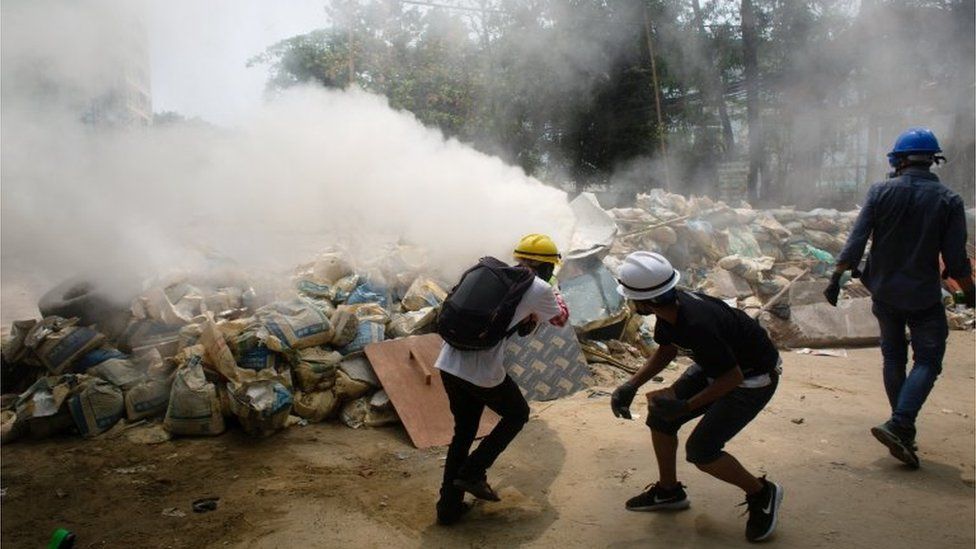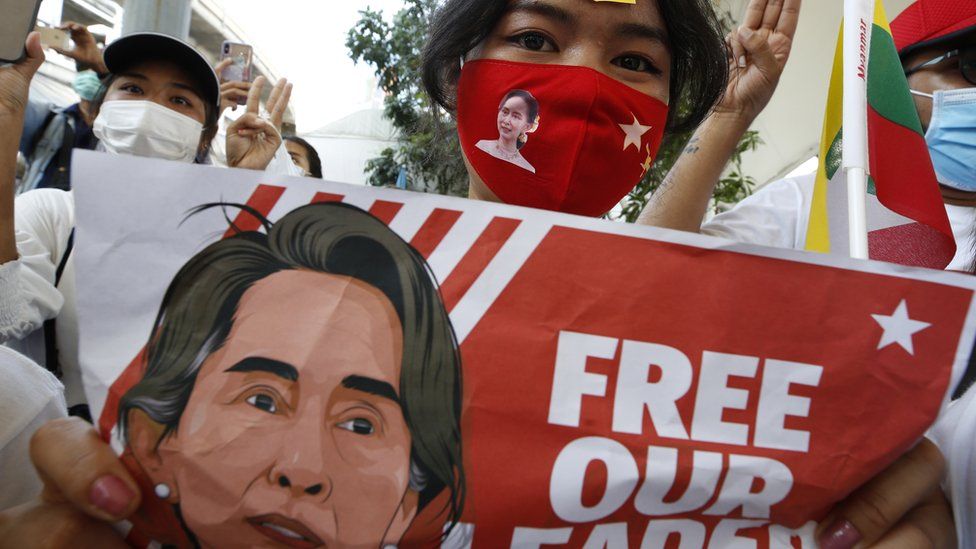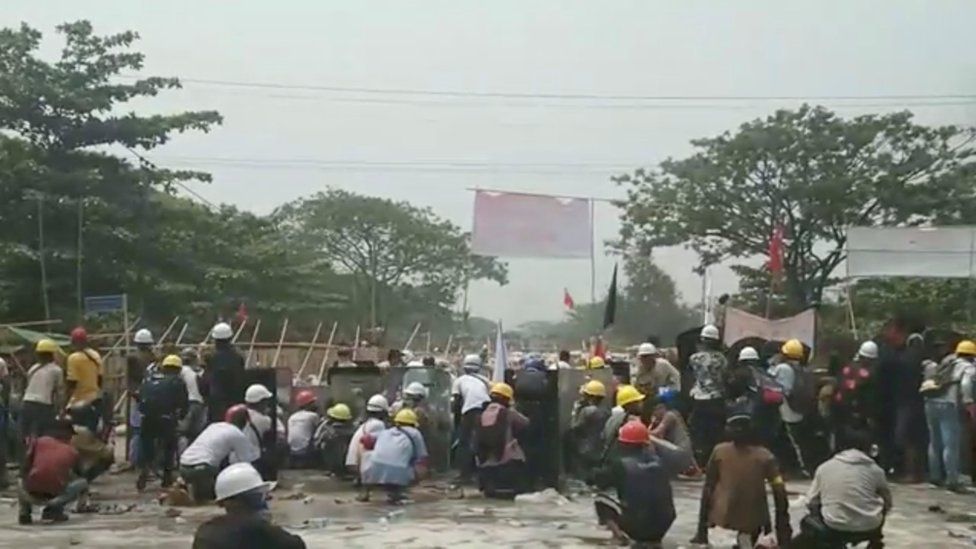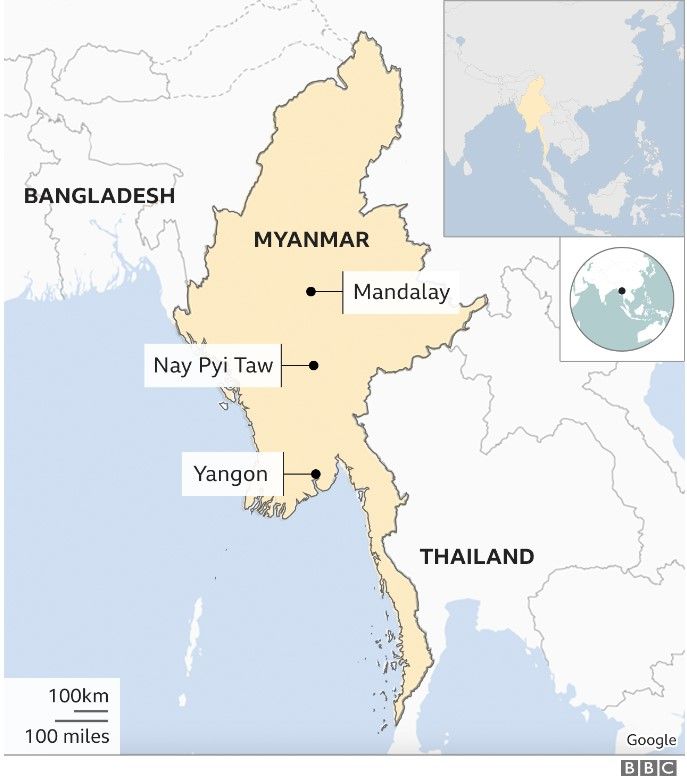
Myanmar's military has imposed martial law across more districts around the country following the deadliest day of protests since February's coup.
About 50 people were reported killed when troops and police opened fire on protesters in various areas on Sunday. Most deaths were in Yangon.
Protesters are demanding the release of ousted civilian leader Aung San Kyi.
She heads the National League for Democracy (NLD) which saw a landslide victory in elections last November.
The military detained most of the NLD leadership after the coup, alleging voter fraud. No proof has been provided.
Ms Suu Kyi has been held at an unknown location since the 1 February coup. She is due to face a slew of charges her supporters say are fabricated.
On Monday, she was due to appear in court, but the virtual hearing was adjourned due to internet problems.
The military initially declared martial law in two districts of Yangon (Rangoon), the country's largest city, on Sunday after Chinese businesses were attacked. Martial law was imposed in several other areas of Yangon and Mandalay on Monday. Protesters there can now be tried in military courts.
Protesters believe China is giving support to the military in Myanmar (also called Burma) but it is unclear who was behind the weekend attacks.

Most of Sunday's casualties were reported in Yangon.
In total, more than 120 protesters have been killed during the crackdown, according to the Assistance Association for Political Prisoners (AAPP) monitoring group.
On Monday there were fresh protests in Mandalay and a number of other locations. Casualties were reported after security forces opened fire on protesters in the central towns of Myingyan and Aunglan.


Over the weekend soldiers and police could be seen calmly firing their weapons directly into the crowds, and dragging off the dead and wounded with no apparent concern for their wellbeing.
Their contempt for the civilian population has been illustrated in multiple videos posted on social media, showing soldiers taunting protesters with their weapons, and in the savage treatment of detainees; this is a military waging war against its own population, and the growing chorus of outrage from other countries appears to be falling on deaf ears.
The generals who led last month's coup are set on imposing their authority on a population in open rebellion.
Indiscriminate gunfire and casual brutality are their chosen methods. There has been no hint yet that they might consider negotiating a peaceful way out with the government they overthrew.

What is Ms Suu Kyi charged with?
The ousted civilian leader is facing charges including "fear and alarm", illegally possessing radio equipment, and breaking Covid rules.
The charges against Ms Suu Kyi carry sentences of several years in jail and could also lead to her being barred from running in future elections if convicted.

Last week, the military also accused the ousted leader of illegally accepting $600,000 (£430,000) and 11kg of gold - a claim the NLD denies.
Ousted MPs call for 'revolution'
Some of the ousted MPs have refused to accept last month's coup and have gone into hiding, forming a new group, the CRPH, or Committee for Representing the Union Parliament.
In his first public address, their leader Mahn Win Khaing Than urged protesters over the weekend to defend themselves against the military crackdown during what he called a "revolution".
"This is the darkest moment of the nation and the moment that the dawn is close," he said, adding: "The uprising must win."
The military considers the CRPH illegal, warning that anyone co-operating with them will face treason charges.
What's the background?
Independent international observers have disputed the military's claim of the fraudulent election held in November 2020, saying no irregularities were observed.
Since the coup the military has used lethal force to try to quell protests, leaving dozens dead and prompting widespread international condemnation.
The US has announced sanctions on coup leaders, while steps are also being taken to block access by the military to $1bn of government funds held in the US.
The military has dismissed criticism of its actions, instead blaming Ms Suu Kyi for the violence.

Myanmar profile
- Myanmar became independent from Britain in 1948. For much of its modern history, it has been under military rule
- Restrictions began loosening from 2010 onwards, leading to free elections in 2015 and the installation of a government led by veteran opposition leader Aung San Suu Kyi the following year
- In 2017, Myanmar's army responded to attacks on police by Rohingya militants with a deadly crackdown, driving more than half a million Rohingya Muslims across the border into Bangladesh in what the UN later called a "textbook example of ethnic cleansing"
- Country profile


https://news.google.com/__i/rss/rd/articles/CBMiLmh0dHBzOi8vd3d3LmJiYy5jby51ay9uZXdzL3dvcmxkLWFzaWEtNTYzOTgwMDHSATJodHRwczovL3d3dy5iYmMuY28udWsvbmV3cy9hbXAvd29ybGQtYXNpYS01NjM5ODAwMQ?oc=5
2021-03-15 10:49:02Z
52781436287965
Tidak ada komentar:
Posting Komentar